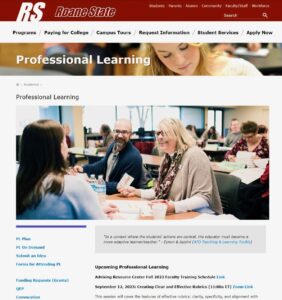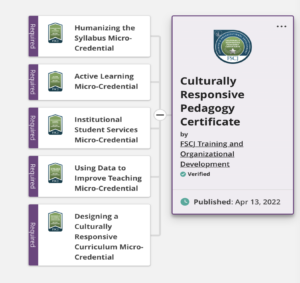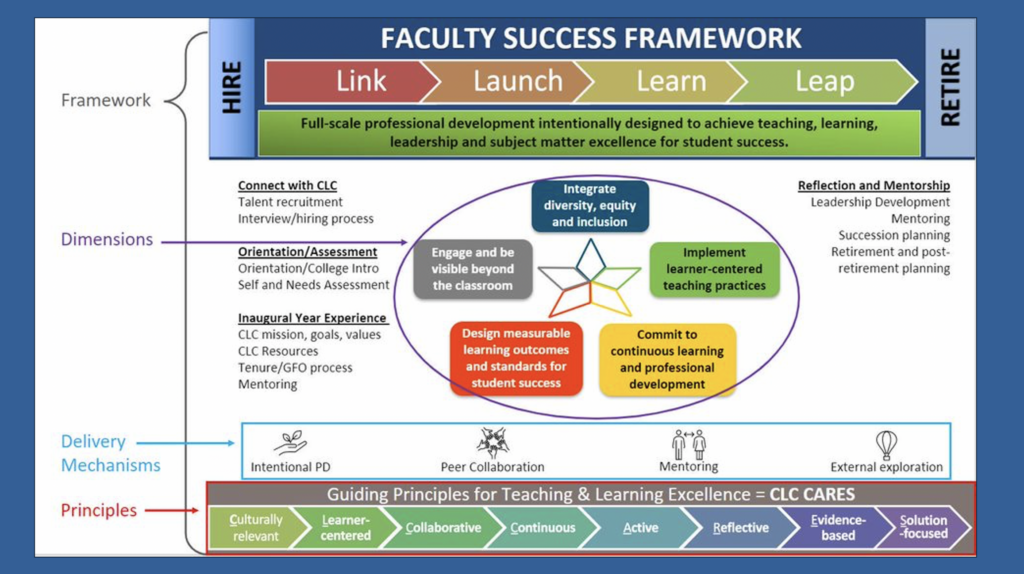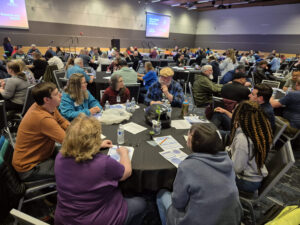“This is the most impactful program I’ve ever taken part in,” says Dr. Deb Fontaine, vice president of strategic and institutional effectiveness at Florida State College at Jacksonville. “We learned so much! It really helped us build momentum for student success.”
Fontaine is describing ATD’s Strengthening Teaching and Learning Seminar, which helps ATD Network institutions activate evidence-based pedagogies and build the high-impact professional learning tools needed to advance equity and student success.
Drawing on research showing that professional learning is “essential equity infrastructure,” the seminar convenes teams from participating ATD Network colleges for monthly virtual sessions, September to April, and leverages the resources of ATD’s acclaimed Teaching and Learning Toolkit. Through the seminar, teams assess their campus’s teaching and learning landscape and identify strategies to strengthen the professional learning support provided to faculty and staff educators. Led by national experts in teaching, learning, and organizational change, the seminar combines the strengths of coaching with the opportunity to learn with and from other campuses.
Fontaine is not unique in her praise for the seminar, which has engaged 37 campus teams since 2020. Participant feedback has been enthusiastic. Nearly 84% of participants found the seminar resources helpful or very helpful. Just over 89% valued the opportunity to dialogue with other campus teams. And more than 95% agreed or strongly agreed that the program helped them identify strategies for strengthening professional learning design and leadership on their campus.
The seminar “was a huge driver for change for us,” explains Dr. Page Wolf, professor and academic director of the Center for Teaching and Learning at College of Lake County. “It provided crucial guidance for reimagining professional learning — what it could be like if we did more than just offer a bunch of small one-off workshops.”
Like other institutions that took part in the seminar, College of Lake County has transformed learning into action. “Now,” says Dr. Wolf, “we’re really making it happen.”
What do we know about the seminar’s impact? What do colleges do with what they learn in the seminar? To explore these questions, we interviewed representatives of six ATD institutions. While previously published articles have detailed the seminar’s design (see this 2022 article in CHANGE Magazine), this blog centers on brief snapshots that illustrate how colleges apply the seminar’s lessons to their own needs.
Getting Started at Roane State
“Taking part in the seminar changed everything for us,” says Karen Brunner, vice president for institutional effectiveness, planning and student success & initiatives at Roane State Community College. Serving 5,000 students in rural Tennessee, Roane State historically offered few pedagogy-focused faculty learning opportunities. The seminar helped Roane launch a robust and effective professional learning program.
Roane State launched a web page to announce its professional learning programs and invite faculty participation.
At many colleges and universities, a center for teaching and learning (CTL) or some other form of professional learning hub hosts programs and services. Roane had a teaching with technology center that helped faculty learn about software but focused comparatively little attention on pedagogy. Based on what they learned in the seminar, Roane’s team created a new faculty committee to work with center staff in guiding new programs focused on high-impact teaching practices. Math professor Jillian Miller, a seminar participant, took on responsibilities for program co-coordination. Through the committee, Roane now offers a wide array of teaching workshops developed in response to faculty interests and needs.
“Taking part in the seminar changed everything for us.”
– Karen Brunner, Vice President for Institutional Effectiveness, Planning and Student Success & Initiatives, Roane State Community College
Brunner also provided funds to a mini-grant program focused on redesigning courses to incorporate collaborative, problem-based learning (PBL) projects. “I learned it was important to give faculty support, time, and incentive to do the difficult work of course redesign,” she says. Stipends and support were provided to help faculty to redesign their courses, integrate and test PBL approaches, and publicly share what they learned. “Sharing was crucial,” says Miller, highlighting the sense of community and mutual support. And as the faculty reflected and shared, the initiative gained momentum.
“The results have been incredible,” Brunner explains. More and more faculty want to take part. And Roane’s survey data suggests students are benefiting, becoming significantly more engaged, knowledgeable, and confident in their abilities. Miller and Brunner say this has encouraged Roane to use similar professional learning models to advance other evidence-based practices and institutional change efforts, including ATD’s new Community Vibrancy initiative.
“It’s created a culture of structured sharing and collaboration, a platform for effective professional learning,” says Brunner, discussing the approaches learned from the seminar. “This has had a major impact on faculty engagement. We could have never gotten this kind of participation before.”
Microcredentials at FSCJ
Some colleges join the seminar planning to launch a professional learning hub. Others already have an operating CTL but want to deepen its work. Florida State College at Jacksonville (FSCJ) falls into this second category.
A large urban institution serving 40,000 students, FSCJ had a Guided Pathways program and an Academy for Teaching and Learning when it took part in the seminar in 2021. In their seminar-built action plan for strengthening professional learning, the FSCJ team focused on new structures to support faculty engagement. They designed an innovative certificate program: faculty who took part in selected programs or courses would be awarded microcredentials that would help them earn salary increases.
FSCJ instituted a microcredential program to recognize faculty’s professional learning engagement.
Implementing this plan, FSCJ launched five courses to help faculty use data to inform their teaching and implement proven practices such as active learning and culturally responsive teaching (see graphic.) The faculty response was enthusiastic. Since launching the program, the courses have enrolled more than 300 faculty participants, and the Academy has awarded 134 microcredentials.
The Academy built on this increased faculty engagement by launching other programs, including an annual faculty professional learning retreat, where faculty come together to reflect and work together on new approaches.
“At the retreat,” explains Dr. Fontaine, “faculty examine data on their own courses. Some focus on redesigning assignments, others on redesigning courses and programs and making their syllabi more responsive, more reflective of who’s sitting in front of them. Then they’re implementing what they learned and worked on. They implement and they want more, so they come back to share and talk about it the next year.”
These efforts are starting to pay off. Student year-to-year persistence rates at FSCJ are up a highly significant two percentage points. And the gains are largest for Black and Hispanic students, with persistence for Hispanics up a full three percentage points.
“The work we did with microcredentialing and culturally responsive pedagogy has been huge,” says Dr. Fontaine. “It’s moving the needle. And it’s having a ripple effect. We’re embedding elements of what we learned in everything we’re doing.” She points to FSCJ’s new Quality Enhancement Plan (a major initiative required for FSCJ’s accreditation) and a broader sense of shared commitment across the campus. “This has changed our culture, changed the feeling of our institution.”
Supporting Campus Customization
ATD research has revealed that the vast majority of community colleges need and want help strengthening professional learning. The seminar directly addresses this need. Participating teams explore an evidence-based framework for high-impact professional learning and consider new strategies they might implement. Working with a coach, they develop a formal action plan, customized to their college’s unique strengths and challenges, which they present to the CAO and other stakeholders. This plan then guides follow-up activities.
At each college, follow-up steps focus on campus-specific goals:
- Amarillo College, with a strong CTL, launched two linked efforts: helping faculty integrate high impact pedagogy into online courses and engaging more part-time faculty in its programs.
- Cuyahoga Community College wanted to unify the independent CTLs operating on its six campuses. After the seminar, the team helped these CTLs work together, following design principles to implement stronger faculty learning communities (a proven structure that supports faculty as they learn about new pedagogies and implement them with students).
- College of Lake County (CLC) launched a faculty learning community focused on active learning pedagogy and strengthened its New Faculty Seminar. The seminar team helped the CTL to intentionally connect its work with the Teaching and Learning Excellence pillar in CLC’s strategic plan. And the CTL is now designing programs to align with a new Faculty Success Framework (see graphic), which will guide faculty progress from hiring to retirement.
“From here on,” says Dr. Wolf, director of CLC’s CTL, “everything we do has a real and purposeful connection with one or more of these dimensions for faculty success.”
The College of Lake County created a Faculty Success Framework to help faculty plan and pursue their professional growth. The CTL plans its programs to support faculty learning aligned with key dimensions.
Faculty Agency and Institutional Change at Clover Park Technical College
While some colleges have joined the seminar to launch a professional learning hub, and FSCJ wanted to strengthen a long-standing CTL, Washington State’s Clover Park Technical College (CPTC) fell somewhere in between. Joining the seminar in 2022, it had a relatively new CTL and a new provost who wanted to help it grow.
“If we’re trying to increase success rates, if we’re trying to close equity gaps, we’ve got to create the best classroom environment possible,” explains Dr. Tom Broxson, provost of CPTC. “Students spend most of their time in the classroom. That means we really need to invest in our faculty and in professional learning around best practices in teaching and learning. We knew that, and that’s why we joined the seminar.”
“The seminar helped us take what we were doing and make it more planful and strategic. It got more faculty involved and helped the executive team understand why professional learning was fundamental to the success of the college. All of that really changed the conversation at CPTC.”
– Tom Broxson, Ed.D., Provost, Clover Park Technical College
“The seminar helped us take what we were doing and make it more planful and strategic,” Dr. Broxson continues. “It got more faculty involved and helped the executive team understand why professional learning was fundamental to the success of the college. All of that really changed the conversation at CPTC.”
Led by English professor Kristin Copeland, the director of their nascent CTL, Clover Park’s seminar team identified a range of innovations that could help the CTL work effectively with faculty, particularly technical faculty who come directly out of industry. Working with Broxson, their plan also informed the development of a new clause in the faculty’s union contract, which included provisions for salary bumps for meaningful professional learning participation.
The most visible programming change implemented at Clover Park focused on linking professional learning and assessment. In fall 2022, CPTC full-time faculty met for one full day to review course and program data on equity, student success, and CPTC’s student learning outcomes. The next week they met again, joining self-selected workshops designed to help them learn about high impact strategies for improvement. The CTL followed this with sustained faculty learning communities that supported faculty as they implemented their selected strategy with students and shared the results.
CPTC instituted an annual two-day professional learning event for faculty.
CPTC has now made this process an annual event. Now a dean, Copeland points out that 100% of CPTC’s full-time faculty take part in the two-day process, and 40–50% join sustained follow-up programs. “We know these high-impact practices work,” she says, “and more and more of our faculty are using them.”
“It’s impressive,” says Broxson. “It’s professional development rounded in empirical reality, real data, and real evidence-based practices. We’re really building a culture that’s data informed and incorporates evidence-based professional learning for a continuous improvement process.”
“We can already see the impact on faculty engagement [and] faculty culture,” Broxson continues. “This is changing the environment in the classroom. And students feel that. Our enrollment is climbing faster than any community or technical college in the state. And we’ve become more diverse as well. I think that’s because the message is getting out in the community that this is where you’re going to feel welcomed and supported. That has a lot to do with our DEI work, but it also has a lot to do with our teaching and learning work.”
Broxson is grateful for the hard work and creativity of Copeland and her team. And he’s quick to spotlight ATD’s contribution. “The seminar provided a lot of resources and capacity-building support for us,” he concludes. “We learned about high-impact practices and how to use professional learning to scale them. We got great coaching and the chance to learn from other schools. And that’s paying all sorts of dividends.”
New Opportunities for ATD Network Colleges
The Strengthening Teaching and Learning Seminar is an annual service available to ATD institutions. It is growing in depth and effectiveness, as representatives from earlier cohorts now meet with new participants to share insights and successful strategies. A 2024-25 cohort will kick off in August 2024 and conclude in April 2025. Interested institutions must apply by August 2, 2024; those applying by June 28, 2024, will receive priority consideration. For information and application materials, go to: https://achievingthedream.org/areas-of-expertise/teaching-learning/building-capacity-for-change/




